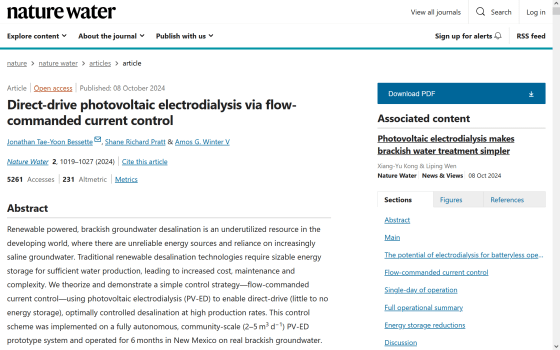MIT engineers develop solar-powered desalination system that produces up to 5,000 liters of clean water per day

Researchers at the Massachusetts Institute of Technology (MIT) have devised a way to use solar power to generate electricity and provide a desalination system in areas without power infrastructure. The system is highly power efficient and does not require batteries, making it suitable for use in inland areas far from the sea.
Direct-drive photovoltaic electrodialysis via flow-commanded current control | Nature Water

Solar-powered desalination system requires no extra batteries | MIT News | Massachusetts Institute of Technology
MIT engineers create solar-powered desalination system producing 5,000 liters of water daily | TechSpot
https://www.techspot.com/news/105237-mit-engineers-create-desalination-system-produces-5000-liters.html
The seawater desalination system developed by a team led by Professor Amos Winter of MIT is based on electrodialysis, a method of removing salt ions from water using an electric field. This type of desalination system has been used in various equipment in the past, but the unique feature of the system developed this time is that it is specialized for solar power generation.
Professor Winter's system incorporates a control model called 'flow command current control,' which allows it to adjust the desalination rate many times per second. This allows the system to work in tandem with the sun, increasing the rate at which water is pumped if it detects an excess of power, and decreasing efficiency if the sun is blocked and there is a shortage of power.
Thanks to its fast response, it is possible to use an average of 94% or more of the electrical energy obtained from the solar panels without waste. In addition, one of its features is that it operates without the need for auxiliary power sources other than batteries or solar power generation, and this feature alone 'sets it apart from conventional seawater desalination systems that rely on stored electricity.'

'Conventional desalination technologies require a steady power supply and batteries to compensate for fluctuating power sources like solar power,' said Professor Winter. 'By constantly varying power consumption in sync with the sun, our system can directly and efficiently use solar power to produce water.'
Another feature of this system is that it specializes in 'brackish water,' which has a salinity between seawater and freshwater. According to Jonathan Bessette, an MIT student involved in the research, groundwater has become more saline than before due to climate change. In developing countries where access to electricity is insufficient and people are dependent on groundwater, it is expected that a system that uses renewable energy to desalinate water could be a simple strategy to bring clean water to local areas.

Related Posts:
in Science, Posted by log1p_kr







